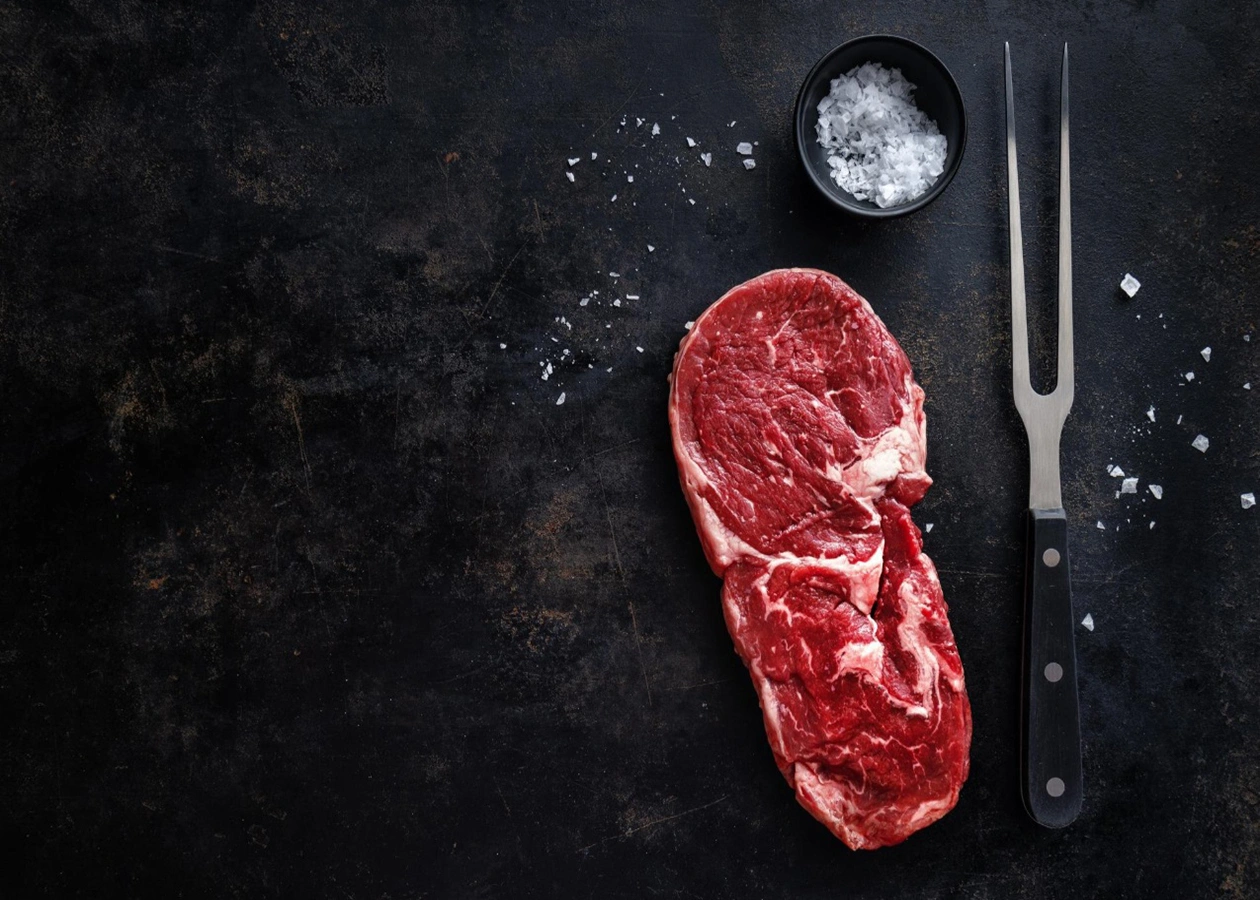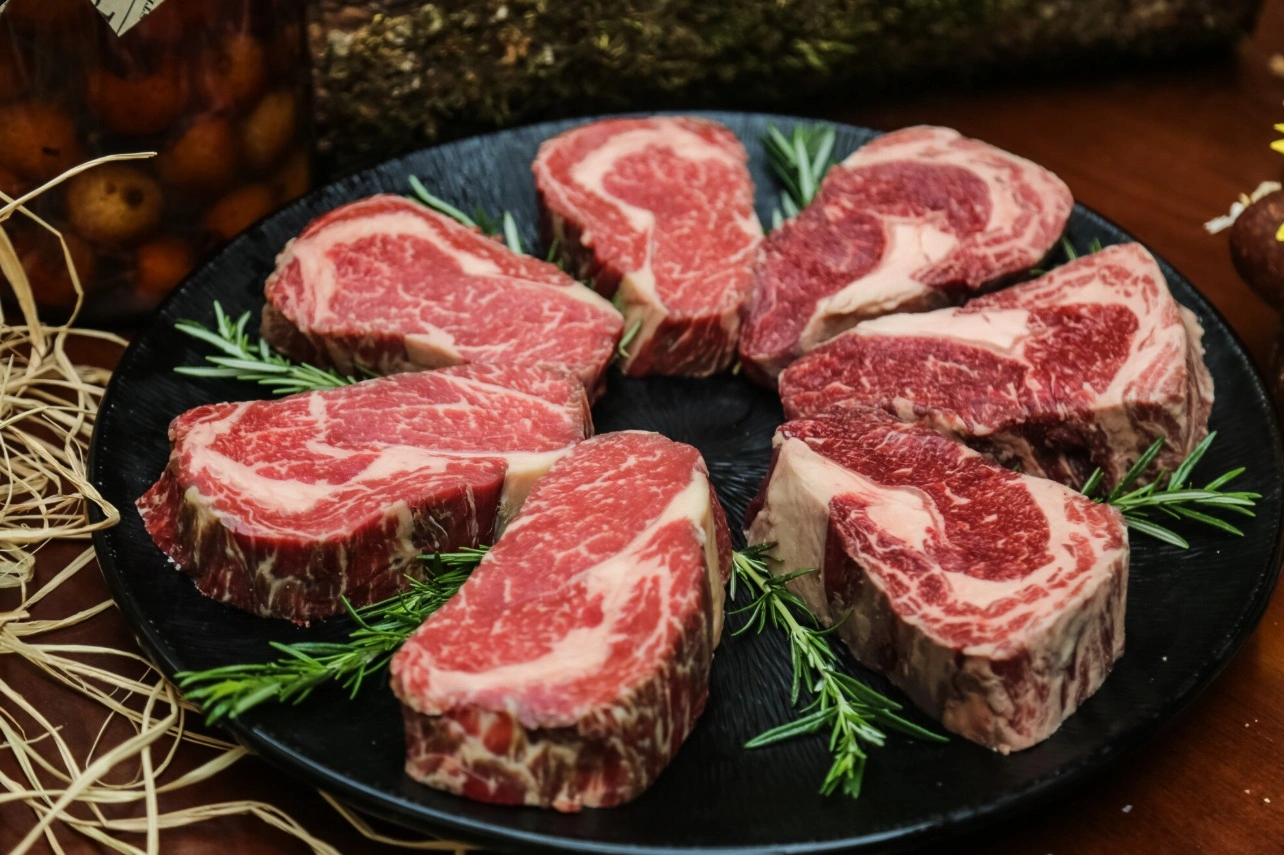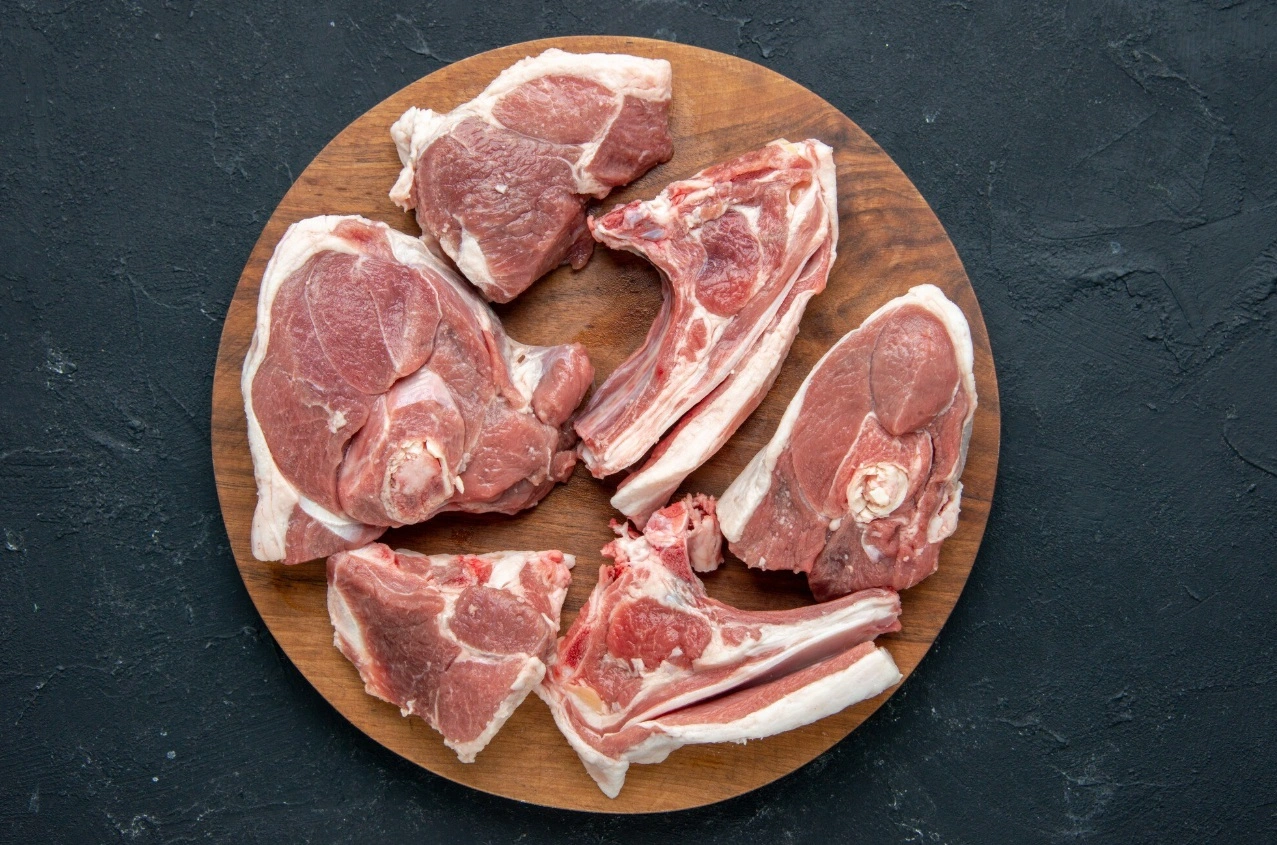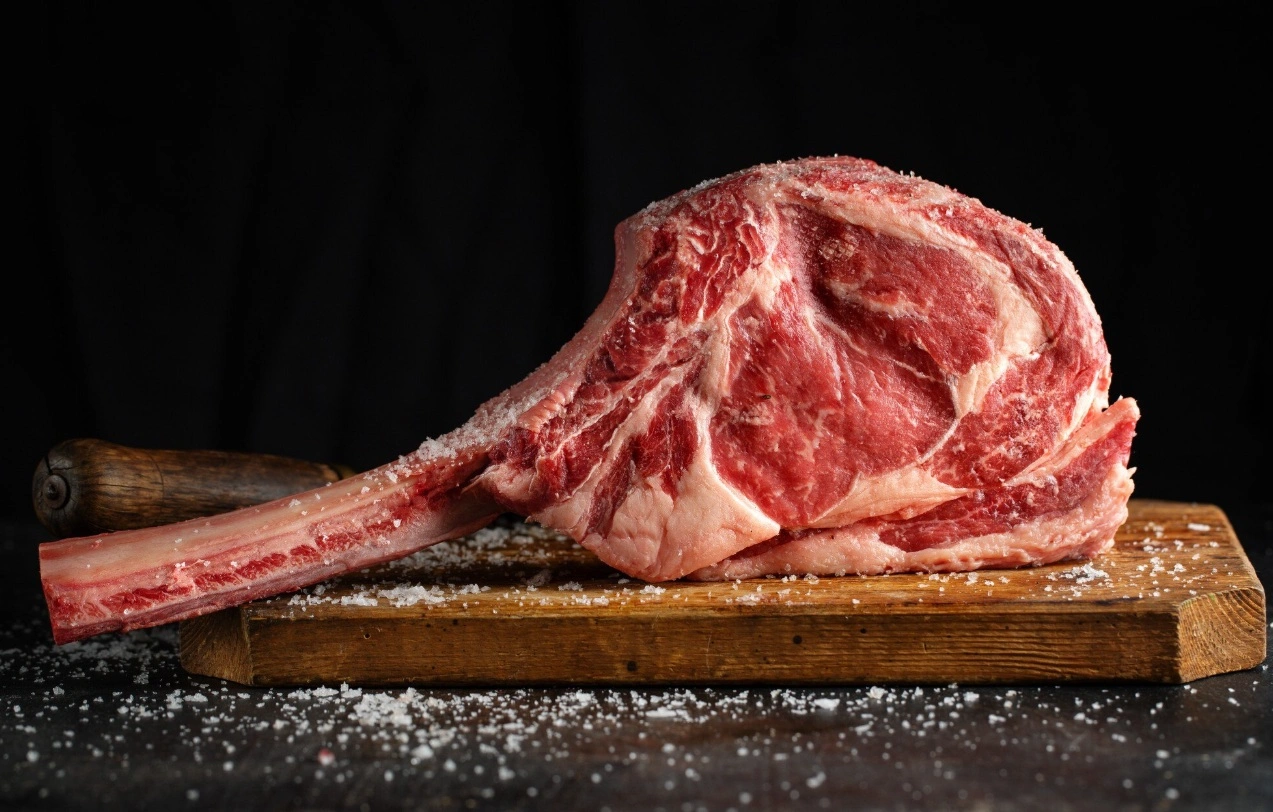
When you start a Keto or Carnivore Diet, one of the first questions you’ll ask yourself is: Does meat have carbs? Well, Most people assume that all meat is completely carb-free, but the reality is a little different. Let’s compare the carbohydrate content of different types of meat, explain why most meats don’t contain carbs, and uncover hidden sources of carbs that can affect your Carnivore results.
Does meat have carbs? Well, the short answer is no. Since meat is the main food source on a Carnivore Diet, it is not surprising that muscle tissue contains no carbohydrates. After all, living animals store glycogen (a form of carbohydrate) in their muscles [1] [2].
However, when an animal is slaughtered, those glycogen stores quickly deplete. Enzymes continue breaking glycogen down into lactic acid, which tenderizes the meat [3].
By the time the meat reaches your plate, almost all glycogen is gone, leaving practically no digestible carbohydrates behind.
This explains why a steak, a chicken thigh, or a piece of fish will list zero grams of carbohydrates per serving on a nutrition label.
This makes meat the ultimate macro-friendly food for Keto and Carnivore dieters: rich in protein and fat, yet free of blood sugar–spiking carbs.
The only real exceptions are organ meats like liver, which contain some glycogen, and certain seafoods. But compared to fruits, grains, or even dairy, the carb amounts in meat are too small.
Learn More: 30 High Protein Low Carb Lunch Ideas for Keto and Carnivore
When it comes to low-carb diets, people focus on net carbs, which are total carbs minus fiber. For meat, however, this is irrelevant. Fresh meat contains neither total carbs nor fiber, so the net carbs equal zero.
Where it matters is with processed meats or shellfish. For example, if a sausage has 3 g total carbs from starches or sugar and 0 g fiber, the net carbs are still 3. If an oyster has 5 g of carbs with no fiber, all of those count toward net carbs.
This is why Carnivore dieters don’t need to worry about net carb math for meat, but if you follow a Keto Diet, you should watch processed meats and shellfish when tracking macros.
Learn More: Why Lab-Grown Meat Is Bad: What Every Carnivore Should Know
Knowing the exact level of carbohydrates in different kinds of meat helps you make a more exact Carnivore Diet meal plan. It is also important to help you manage macros.
Using this free Carnivore Macro Calculator, you can find the right balance of macronutrients based on your age, gender, and activity level.

Fresh cuts of meat such as steak, pork chops, chicken breast, and lamb contain 0 grams of carbohydrates. These foods provide protein, fat, iron, B vitamins, and zinc, but no carbohydrates, which makes them the main foods for both Keto and Carnivore diets [4] [5].
Learn More: Is Lamb Healthier than Beef? Which Is Better: Lamb vs Beef
Organ meats, like liver, retain small levels of carbohydrates (glycogen). Beef liver has about 3–4 grams of carbs per 100 g, while chicken liver contains about 0.9–1 gram.
Although these numbers are small, they can add up if you eat organ meats too frequently.
Learn More: Carnivore Diet Cloud Bread Recipe: Fluffy and Zero-Carb
Most fish, including salmon, tuna, sardines, and cod, contain 0 grams of carbs. However, shellfish can contain small amounts:
The number of carbohydrates in these foods is acceptable for Keto dieters and most Carnivores. However, if you are on a zero-carb Carnivore, you need to minimize or avoid them.
To help you make better decisions, we have provided the following table, which compares the carbohydrate content of common meats per 100 grams.
Learn More: 15 Amazing Carnivore Diet Recipes You Haven’t Tested Before
While fresh meats are nearly carb-free, processed and cured meats contain added carbohydrates. Ingredients like sugar, starch, breadcrumbs, or marinades can easily sneak into sausages, deli meats, and even bacon.
For example:
These numbers may seem small, but they add up quickly if you eat too much processed meat. For individuals following a zero-carb Carnivore Diet, even these minimal carbs can interfere with the diet goals.
Learn More: Bone Marrow Nutrition Facts: Knowing the Carnivore Superfood

In a Ketogenic Diet, you can generally consume about 20–50 g of carbohydrates per day. Since fresh meat has zero carbs, it is a safe base. Small amounts from organ meats or shellfish can still fit within a Keto lifestyle.
The standard Carnivore Diet aims for zero carbs, meaning your daily calories cannot come from plant-based foods but only from meat, fish, eggs, and animal fats.
So, eating liver or high-carb shellfish technically breaks the zero-carb rule. However, many Carnivore dieters either limit these foods or eat them in moderation to gain the necessary nutrients.
Keeping the daily carbohydrates under 5% is good enough for almost all Carnivores, except if you want to cut all carbohydrates for a short time to hit a specific target, like quick weight loss or improving health markers.
Anyhow, it is important to remember that meat’s nutritional value goes far beyond carbohydrates.
Learn More: Carnivore Diet Before and After Results + Photos
Although it is important to know and consider the carbohydrate content of meat, you should know that meat offers:
Organ meats, especially liver, provide vitamin A, folate, and copper, though they bring a few carbohydrates along.
Processed meats, on the other hand, can cause unwanted risks, like added sugars, nitrates, and higher sodium intake.
Research suggests a link between heavy processed meat consumption and increased risk of heart disease and cancer. That is why most low-carb experts recommend using fresh, unprocessed cuts of meat.
Learn More: Zero Carb Foods to Have on Keto and Carnivore Diets

So, does meat have carbs? Fresh meat is virtually carb-free, which makes it a great source of fat and protein for those who follow Keto and Carnivore diets.
Other animal-based foods that are common but contain a small number of carbohydrates are organ meats (like liver), some shellfish, and processed meats, which also have hidden additives.
By choosing whole, unprocessed cuts, you can enjoy a low-carb or zero-carb lifestyle while benefiting from the rich nutritional effects of meat.
Learn More: Carnivore Diet Chicken Casserole for Lunch and Dinner
Does meat have carbs? Let’s find answers to the most frequently asked questions in this regard.
Learn More: White Meat vs. Dark Meat: Which One Is Better for You?
No, fresh beef steak contains zero grams of carbohydrates.
Among common meats, beef liver has the highest carb content, about 3–4 g per 100 g.
Yes, but in moderation. While it is highly nutritious, liver does contain a few grams of carbohydrates.
Sometimes. Processed meats may include sugar or starch. So, always check nutrition labels.
Yes, but very little, about 0.6 g per egg, which is negligible for those on a Keto or Carnivore Diet.